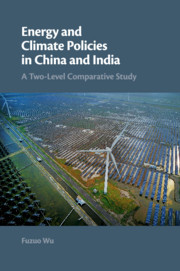Description
Energy and Climate Policies in China and India
A Two-Level Comparative Study
Author: Wu Fuzuo
Explores the shaping of China and India's energy and climate policies by two-level pressures characterized as wealth, status and asymmetrical interdependence.
Language: English
Subject for Energy and Climate Policies in China and India:
Approximative price 32.87 €
In Print (Delivery period: 14 days).
Add to cart
Energy and Climate Policies in China and India
Publication date: 03-2020
Support: Print on demand
Publication date: 03-2020
Support: Print on demand
Energy and Climate Policies in China and India
Publication date: 10-2018
328 p. · 15.7x23.5 cm · Hardback
Publication date: 10-2018
328 p. · 15.7x23.5 cm · Hardback
Description
/li>Contents
/li>Biography
/li>
The book explores the proactive and reactive features of China and India's domestic and foreign policies to address two intertwined challenges: first, China and India have taken policy measures that accord with their own domestic priorities; second, both countries have had to alter the trajectory of their proactive policy measures as a result of external pressures. The book argues that China and India's proactive and reactive policy measures to address energy insecurity and climate change have been shaped by their two-level pressures. At the domestic/unit level, both countries have had to sustain fast economic growth and eradicate poverty in order to maximize their economic wealth. At the international/systemic level, both countries have sought to enhance their great power status in the international system which is characterized by not only asymmetrical interdependence but also global governance in general, and global energy and climate governance in particular.
Part I. Introduction and Analytical Framework: 1. Introduction; 1.1. China and India's puzzling energy and climate policy behavior; 1.2. Argument in brief and propositions; 1.3. Literature review: levels of analysis; 1.4. Case selection; 1.5. Contributions of the book; 1.6. Structure of the book; 2. Shaping China and India's energy and climate policy behavior: wealth, status and asymmetrical interdependence; 2.1. China and India: proactive and reactive state actors; 2.2. Two-level pressures: wealth, status, and asymmetrical interdependence; 2.3. Conclusion; Part II. The Inside-Out: 3. China and India's domestic energy policy: proactive; 3.1. Energy security: a top priority for China and India; 3.2. China and India's proactive domestic measures to procure energy security; 3.3. Differences between China and India's domestic energy policy approaches; 3.4. Conclusion; 4. China and India's energy diplomacy: proactively preempting and reactively restraining; 4.1. China and India's energy diplomacy: proactive and reactive; 4.2. China and India's energy diplomacy toward Iran; 4.3. China and India's energy diplomacy toward Sudan; 4.4. China and India's energy diplomacy toward Myanmar; 4.5. Comparison of the three cases; 4.6. Shaping China and India's energy diplomacy: two-level pressures; 4.7. Conclusion; Part III. The Outside-In: 5. China and India negotiating climate change: proactively free-riding and reactively burden sharing; 5.1. China and India's dual-track climate diplomacy; 5.2. Compromises under duel-track climate diplomacy; 5.3. Shaping China and India's climate diplomacy: two-level pressures; 5.4. Conclusion; 6. China and India's domestic climate policy: reactive; 6.1. Pressures from epistemic communities to address climate change; 6.2. China and India's reactive domestic policy measures to address climate change; 6.3. China and India subordinating climate change to energy security; 6.4. Shaping Sino-Indian domestic energy and climate policy: two-level pressures; 6.5. Conclusion; Part IV. Implications and Conclusion: 7. Implications for global energy and climate governance; 7.1. Global energy and climate governance; 7.2. Implications of Sino-India addressing energy insecurity and climate change for global energy and climate governance; 7.3. Conclusion; 8. Conclusion; 8.1. Principal findings; 8.2. Implications for international relations research; 8.3. Understanding China and India's rise.
Fuzuo Wu is an Assistant Professor at Aalborg University, Denmark. She holds a Ph.D. in International Relations from Fudan University, and was a postdoctoral researcher at Princeton University, the University of Oxford, and Yale University; a Visiting Senior Research Fellow at Lee Kuan Yew School of Public Policy, National University of Singapore; a Research Fellow at Center for Chinese Foreign Policy Studies at Fudan University; and a Junior Research Fellow at the Institute of South Asian Studies at Sichuan University, China. She has published a book in Chinese and a few articles in peer-reviewed journals, such as the Journal of Contemporary China, Asian Survey, Asian Perspective, and the Journal of Chinese Political Science.
© 2024 LAVOISIER S.A.S.




